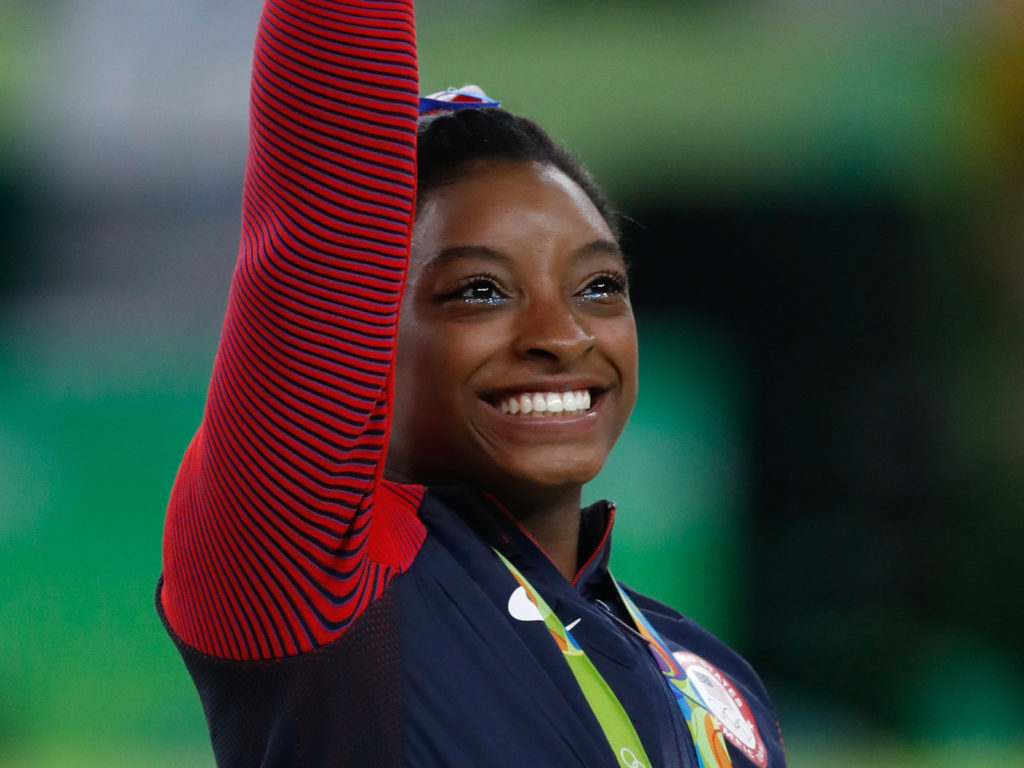Simone Biles is an Olympic champion. That must be said upfront. But what also needs to be said–and it’s unbelievable that it does–is that even if Biles wasn’t an Olympic medalist, we should still respect her humanity. We should still respect her mental health. That is the least we can do.
And yet, it seems like human decency is too much for some people to bear, men in particular. Ever since Biles stepped down from her role in the U.S. gymnastics team at the Tokyo Olympics, preferring to stay on the sidelines out of an abundance of caution for her mental and physical health, people have come out of the woodwork degrading her for putting herself first.
Nasty right-wing opportunists, the kind who gain their only power from social media and a microphone, have baited their listeners with all types of vitriol about how un-American Biles is for not refusing to ignore the warning signs and compete anyway. Charlie Kirk, for instance, called Biles part of a generation of “weak people,” knowing his base and the more extensive GOP base gain their energy from deriding prominent Black Americans.
The shock jock pundits versed in Trump’s punch-down ideology, of course, create political repercussions. MSNBC’s Chris Hayes commented on the connective tissue between GOP pundits mocking Biles and those deriding the Capitol police who testified about the Jan. 6 insurrection. Hayes quoted Adam Sewer’s 2018 Atlantic post entitled “The Cruelty Is the Point,” in which he outlines Trumpist ideology in a nutshell:
“Trump’s only true skill is the con; his only fundamental belief is that the United States is the birthright of straight, white, Christian men, and his only real, authentic pleasure isn cruelty.”
“When you build a political movement whose emotional core is transgression and cruelty, ultimately no one is safe from that kind of treatment,” Hayes said.
The Trumpist ideology was carried out in real-time, not just by right-wing opportunists but by those in political office like Aaron Reitz. Reitz, a Texas deputy attorney general, recently apologized for a now-deleted tweet in which he called Biles a “selfish, childish, national embarrassment.” In his tweet, as reported by NBC News, Reitz compared Biles to Kerri Strug, who famously won gold in gymnastics in 1996 while competing on a twisted ankle.
You can see the implications–a young white woman endured while the Black one didn’t, bringing supposed shame to the nation. How our national reputation depends on tumbling exercises and balance beam performances and not on, say, funding the destabilization of other countries for the U.S. government’s selfish reasons is a riddle for you to figure out. But regardless, the backlash, including commentary from Strug herself, was swift enough that Reitz deleted his tweet and posted an apology.
“My personal social media comments do not represent Attorny General Paxton or the office of the attorney general,” he wrote. “In a moment of frustration and disappointment, I opined on subjects for which I am not adequately versed. That was an error. I can’t imagine what Simone Biles has gone through. Simone Biles is a true patriot and one of the greatest gymnasts of all time. I apologize to her and wish her well.”

Reitz honestly can’t imagine what Biles has been through. Not only is Reitz not an Olympian, much less an athlete, he also didn’t take into account that he was punching down on a young woman who had already lived through a significant mental health blow years prior. Biles is one of the hundreds of young women who accused disgraced gymnastics coach Larry Nassar of sexual assault. As The Bulwark’s Olivia Neistat, herself a former NCAA Division I gymnast, reports, “Long before she stepped away from the team finals in Tokyo, the undisputed greatest gymnast of all time stepped away from gymnastics entirely. She took two years off from competition after the 2016 Olympics before deciding to return to competition. So you can’t really understand what happened in Tokyo until you understand what made her come back.”
“‘I knew I had more to give to the sport, for myself,” Neistat reported Biles as saying in an interview held before the Olympics. “‘And I felt like I had a purpose, and now I feel like I do, and that’s to be a voice for the younger generation. And I feel like I’ve done that…I just feel like everything that happened, I had to come back to the sport to be a voice, to have change happen. Because I feel like if there weren’t a remaining survivor [of former team doctor and convicted sex offender and child pornographer Larry Nassar] in the sport, they would have brushed it to the side.'”
What Neistat seems to argue is that Biles was aware that the arrest and conviction of Nassar didn’t change the minimizing culture of U.S. gymnastics. The arrest wouldn’t immediately reform a culture that disregards abuse, mental health, and even physical health, like Strug performing on a bad ankle. Instead, Biles went back to the sport to be a force from within, advocating for future gymnasts purely through her presence. If she is there, Biles intimated in the interview, no one in the gymnastics organization can pretend like Nassar didn’t exist. Biles put herself on the frontlines for girls like her, which means she put her mental and physical health on the line too. The “strong Black woman” trope Black women are often assigned is because we often feel like no one will solve the problems that face us except for us. Clearly, Biles felt the same way about the inner workings of the sport that made her a star.
However, personal sacrifice, even sacrifices made for good reasons like Biles’, is expected in the world of sport. The narrative we’ve always been fed from competition is the art of the sacrifice, the nobility of sacrifice, the congratulatory responses people get when they push themselves to the edge. That’s why Neistat wrote that Biles’ decision to bow out of the competition was “something I never once considered during my more than a decade as a competitive gymnast.”
“By [prioritizing herself], she gave thousands of gymnasts at every level across the country and around the world permission to put their welfare first,” she wrote. “It was an act of radical courage.”
Biles’ mental health was affecting her physical performance to the point of possible injury. The Olympics has seen what happens when athletes don’t prioritize the signs their bodies are giving them–the decision often results in injury and, in some cases, death. “That’s why her decision to step back sent such a powerful message: It’s one thing to lose a medal, but quite another to lose a person,” Neistat wrote.
![Simone Biles at the 2017 ESPYs, receiving the award for Best Female Athlete (ABC/Image Group LA [Creative Commons license])](https://www.colorwebmag.com/wp-content/uploads/2021/08/35758763181_c93fcbb79a_h-1024x682.jpg)
While it’s one thing for the racist right to see Biles as a punching bag, it’s even more hurtful when a Black celebrity also disregards Black humanity. Saturday Night Live star Michael Che recently had the entire internet turn against him after allegedly making and co-signing horrifying jokes at Biles’ expense in his Instagram Stories.
“man, i wanna make fun of simone biles,” he allegedly wrote. “i got like 3 mins of simone biles jokes in my head. im going to the cellar tonight to say them into a microphone. as the dorky kids say, im choosing violence.”
He also allegedly reposted and rated jokes from followers such as, “Larry [Nassar] understands Simone Biles better than anyone. He too had to quit doing what he loved at the pinnacle of his career because of mounting pressure.” Another follower’s joke read, “Okay so i am shivering while typing this..but you are encouraging me. “Who said black don’t crack?” Che allegedly gave these jokes 9 and 8 out of 10, respectively.
Che has been an online bully before, most recently creating a mini-campaign of social media posts against a critic who gave a less-than-stellar review of his HBO Max series, That Damn Michael Che. And while he has always gotten backlash from his outbursts, the resounding repudiation of Che’s and others’ jokes lead to Che post that he had been “hacked.” No one believed him, of course; in response to the continued backlash, Che scrubbed his Instagram and deleted his Twitter account. He made a quick return to Instagram to try to promote an upcoming comedy show. Meanwhile, people are still calling for NBC and HBO Max to fire him.
Variety’s Daniel D’Addario wrote that what Che considers jokes is a symptom of a more significant cultural problem.
“Che’s jokes about Biles, as well as his implication that there’s an endless wellspring of things to mock about a young assault victim having a hard time on the world’s largest stage, comes from a place of a strange and familiar cruelty that has often been reserved for his critics,” wrote D’Addario.
“The collateral damage” of parts of culture such as mental health becoming politicized, he continued, “is people like Biles–a young woman who made an obviously difficult decision, and is rewarded with jokes about her sexual assault told by a comic who doesn’t know how to pick on people his own size.”
Che’s comments also indicate a phenomenon of Black men using Black women as sponges for offensive behavior.
Police might target Black men across the country, and they might have their fair share of racism to deal with. But Black men still have a privilege over Black women, and that is simply in being a man in a patriarchal society. As members of the patriarchy, men of any race have the opportunity to pick and choose when they want to be a feminist, when they want to sexualize or objectify a woman or treat them with dignity. The Me Too movement might have put a damper on the patriarchy’s freedom to run roughshod over women’s lives, but gender privilege still exists. And in America, one of the biggest privileges of being a man is putting down Black women with impunity.
Seeing how America was founded makes sense that women of color, particularly Black women for the sake of this article, are often derided for white manhood. One unspoken element in this country is that for nonwhite men to gain access to some privileges of whiteness–i.e., power, prestige, and acceptance into the “boys club,” as it were–that man is faced with a choice of aligning themselves with women that are “approved” by the patriarchy.
Generally, this falls along colorist and racist lines–too often in this country, white or “exotic”-looking women get praised. In contrast, Black and darker-skinned women are considered unworthy and ripe for mocking. Case in point: the amateur “comedians” Che highlighted in his now-deleted Instagram posts were white, and at least one of them was a white woman. A Black man was uplifting a white woman who made fun of a Black woman and sexual assault victim for choosing her mental health over a possible injury. Make it make sense.
Stereo Williams, who is Black, wrote for The Daily Beast about how Black men have often taken Black women for granted out of habit. He even includes himself in that demographic of men.
“There have been times when I know I’ve talked over or talked down to Black women who were more accomplished, more astute and obviously more patient than I,” he wrote. “It’s something that I didn’t want to believe applied to me, but reflecting on some of the worst social media exchanges I’ve had over the years, more than a few happened because I felt obligated to ‘correct’ a Black woman on her own perspective–or because I refused to ake what she was saying seriously. As I sat todwn to write this, prepared to wag a sanctimonious finger at French Montana [for using offensive terms against a Black woman because she didn’t like his music], I had to look at myself. And I also had to think about how many conversations I’ve had with male friends who felt they’d been ’emasculated’ just because they were publicly criticized or reprimanded by a Black woman. How often are we the enablers, or worse, endorsers of what others have done–and continue to do–to Black women?”
It’s a shame it has to be said that I know it’s not all Black men, nor is it all men, period. But there are enough men that casually degrade Black women, Che included, that this has to be said. If more men, particularly Black men, checked their friends or others online when a Black woman is being disrespected, perhaps we wouldn’t have to continually talk about what Black men do or don’t do.
But with that said, perhaps the tide is shifting a bit. As I wrote about Che’s comments for Shadow And Act, I saw scores of Black women and men stick up for Biles and honor her decision to do what’s best for her. I saw men publically denouncing Che’s brand of “humor,” and it made me happy. Could it be because Biles is also a monetary asset and is, in turn, still objectified because of her material worth? That’s certainly a cynical take. But I’d like to believe people came to her defense because of her immaterial worth, her worth as a human being. Perhaps Che’s bone-headed moment provided a catalyst for Black men and women to come together on one issue–that if others are attacking us, we don’t need to attack each other needlessly.
If anything, the backlash has proven that people are tired of the punching-down-as-normal mentality that is still a hold-over from Trump’s time in office. They are fighting back against such abuse with fervor. And their efforts have been felt by Biles herself.
“The outpouring of love & support I’ve received has made me realize I’m more than my accomplishments and gymnastics which I never truly believed before,” Biles wrote on Instagram.
Let’s hope Biles keeps feeling enough love and support to drown out the haters for years to come.

